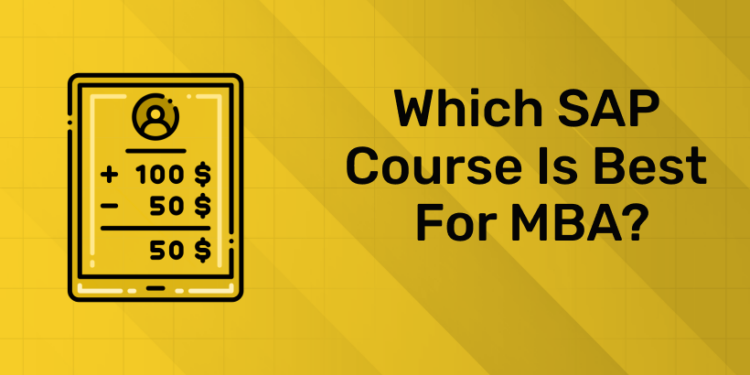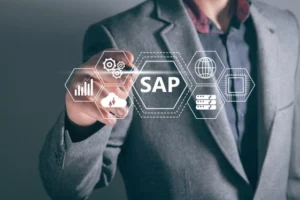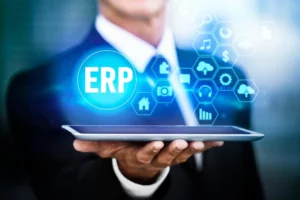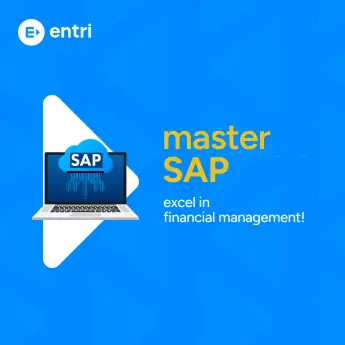Table of Contents
MBA with SAP certification offers lucrative career opportunities. Global companies are looking for qualified and well-trained SAP professionals who also hold an MBA degree. MBA with SAP makes for a very industry-oriented and employable combination. There are several SAP courses for MBA graduates.
Join to learn SAP FICO from the Experts! Click for the demo class!
Key Takeaways:
- Pairing MBA + SAP certification boosts employability and opens access to global, high-paying job roles.
- Choose your SAP module based on your MBA specialization (e.g., FICO for Finance, HCM for HR, MM for Operations).
- Popular SAP courses for MBAs include SAP FICO, SAP HCM, SAP MM, SAP SD, and SAP PP.
- A good SAP course offers live training, practical labs, mentorship, placement assistance, and industry certification.
- Stay competitive with future-proof SAP skills like SAP S/4HANA.
How Does SAP After an MBA Help Your Career?
When you complete MBA, you get a comprehensive understanding of business and management principles. This gives you the ability to develop the skills and knowledge needed to make an impact in your field.
With SAP, you will gain access to a range of resources and tools to develop your skills in your area of interest. It increases opportunities by giving you a competitive edge in the job market. A SAP certification after an MBA degree, significantly boosts your career prospects.
It opens doors to higher-paying roles in finance, supply chain, HR, and operations within organizations using SAP ERP systems. SAP knowledge helps you make data-driven decisions and understand integrated business processes, enhancing your managerial effectiveness.
Pro Tip: Combining MBA strategy skills with SAP technical know-how creates a rare and highly demanded profile in today’s job market.
SAP Course for MBA Graduates
To choose a SAP course after an MBA, you should look into your area of interest. There are various SAP courses across various fields, including finance, management, and human resources. The SAP course for MBA graduates is:
Operations
- SAP SD (Sales and Distribution): Manages order-to-cash processes, billing, pricing, and shipping.
- SAP MM (Material Management): Covers procurement, inventory, and warehouse management.
- SAP PP (Production Planning): Focuses on manufacturing processes and material planning.
Finance
- SAP FICO (Financial Accounting (FI) and Controlling (CO)): Core financial module handling accounting, asset management, cost control, and financial reporting.
- SAP S/4HANA: Advanced version for real-time analytics and financial management.
- SAP FSCM (Financial Supply Chain Management): Manages risks and cash flow across financial supply chains.
Human Resources
- SAP HCM/ SAP HR (Human Resource): Covers payroll, recruitment, performance management, and employee data management.
Marketing and Management
- SAP MM
- SAP SD
- SAP FICO
These modules also apply here, depending on roles focused on customer management, supply chain, or financial oversight.
Master SAP with Expert-Led Courses
Unlock your potential with our comprehensive SAP courses! Learn essential modules like SAP MM (Materials Management), SAP SD (Sales and Distribution), and SAP FICO (Financial Accounting and Controlling) from industry experts.
Know MoreWhat Makes a Good SAP Course for MBA Graduates?
When choosing your SAP training, look for courses that include:
-
Comprehensive, specialization-aligned syllabus: From basics to advanced concepts.
-
Live classes and practical labs: Interactive sessions with real SAP software experience.
-
Mentorship and career support: Guidance from industry experts and placement assistance.
-
Certification: Industry-recognized SAP certification to validate your skills.
-
Flexible learning options: Recorded sessions and self-paced study for busy MBA schedules.
For example, Entri’s SAP FICO course offers all these features, making it ideal for MBA Finance graduates seeking practical, certified skills.
Career Pathways After SAP Certification for MBA Graduates
Completing an SAP course after your MBA unlocks a wide array of rewarding career opportunities across industries. The combination of business knowledge and technical SAP skills makes you highly desirable in the job market. Here are several common career paths you can pursue:
1. SAP Functional Consultant
-
Specializes in configuring and implementing specific SAP modules like FICO, HCM, or MM.
-
Acts as the bridge between business users and technical teams, ensuring the ERP system meets business needs.
-
Roles often require travel and client interaction, making it a dynamic field for those who enjoy consulting and problem-solving.
2. Financial Analyst / SAP FICO Specialist
-
Leverages SAP financial modules to analyze company finances, control budgets, and generate reports.
-
Helps businesses optimize costs, manage assets, and ensure compliance with financial regulations.
-
Ideal role for MBA Finance graduates who want to apply analytical skills with SAP expertise.
3. Supply Chain or Operations Manager (SAP MM / SD / PP)
-
Uses SAP modules to manage procurement, inventory, distribution, and production planning.
-
Responsible for streamlining supply chains, reducing costs, and improving operational efficiency.
-
These roles are critical in manufacturing, retail, and e-commerce sectors.
4. HR Manager / SAP HCM Expert
-
Manages employee data, payroll, recruitment, and performance evaluation via SAP tools.
-
Ensures smooth HR operations with compliance to labor laws and company policies.
-
Suitable for MBA HR graduates focusing on technology-driven people management.
5. ERP Project Manager
-
Oversees SAP implementation projects, coordinating between stakeholders, consultants, and IT teams.
-
Ensures projects are delivered on time, within budget, and meet business objectives.
-
Requires strong management and business process knowledge alongside technical understanding.
Growth Opportunities
-
With experience, roles evolve into senior consultant, SAP architect, or strategic leadership positions.
-
Specialized SAP certifications (like SAP S/4HANA) and continuous learning increase your earning potential and marketability.
-
Global demand for SAP professionals also opens doors for international career moves.
Pro Tip: Combining domain expertise from your MBA specialization with SAP skills gives you a competitive edge in niche roles.
Learning Tips for MBA Graduates Studying SAP
Successfully mastering SAP after your MBA requires a strategic approach. Here are effective learning tips tailored for MBA grads to help you get the most out of your SAP training:
1. Leverage Your Business Knowledge
-
Connect SAP concepts with your MBA’s business frameworks to understand the “why” behind processes.
-
For example, relate financial modules (FICO) to accounting principles learned during your MBA.
-
This integration accelerates comprehension and helps apply SAP in real-world scenarios.
2. Focus on Hands-On Practice
-
Request access to SAP sandboxes or trial versions provided by your course to gain practical experience.
-
Practice configuring scenarios, running transactions, and generating reports.
-
Practical skills differentiate certified candidates from those with just theoretical knowledge.
3. Use Real-Life Case Studies
-
Analyze business problems and solve them using SAP modules you’re learning.
-
Many courses include simulated projects; engage deeply with them to build problem-solving skills.
-
This will prepare you for client interactions or job tasks where you apply SAP solutions.
4. Schedule Consistent Study Time
-
Dedicate regular daily or weekly study sessions despite MBA workload or job responsibilities.
-
Use recorded sessions or self-paced modules if available to learn flexibly around your schedule.
5. Join SAP Communities and Forums
-
Participate in online SAP forums like SAP Community Network (SCN) or LinkedIn groups.
-
These platforms provide networking, problem-solving help, and insights on industry trends.
-
Interacting with peers and experts broadens your perspective and fosters continuous learning.
6. Seek Mentorship
-
Find mentors experienced in SAP implementation or consulting.
-
Mentors provide guidance, career advice, and practical tips that accelerate your learning curve.
7. Prepare for Certification Exams
-
Regularly review exam objectives and sample questions.
-
Take mock tests to identify knowledge gaps and boost confidence before certification.
Pro Tip: Combine your SAP learning with project experience or internships to gain hands-on exposure and improve employability.
Master SAP with Expert-Led Courses
Unlock your potential with our comprehensive SAP courses! Learn essential modules like SAP MM (Materials Management), SAP SD (Sales and Distribution), and SAP FICO (Financial Accounting and Controlling) from industry experts.
Know MoreChallenges MBA Graduates May Face While Learning SAP and How to Overcome Them
While SAP certification is highly beneficial, MBA graduates often face specific challenges transitioning into this technology-intensive field. Understanding these hurdles and how to tackle them can ensure a smoother learning journey.
Challenge 1: Complexity of SAP Software
-
SAP systems are vast with many modules, transactions, and configurations, making initial learning overwhelming.
-
Solution: Start with fundamentals in your chosen module, focus on one area at a time before broadening your scope. Use structured courses that build knowledge progressively.
Challenge 2: Bridging Theory and Practice
-
MBA programs focus on theory and strategy, whereas SAP demands hands-on technical skills.
-
Solution: Prioritize practical labs, simulations, and real SAP software practice. Try to intern or volunteer in companies using SAP to gain real-world experience.
Challenge 3: Managing Time with MBA and SAP Learning
-
Balancing MBA coursework, assignments, and SAP training can lead to schedule conflicts and burnout.
-
Solution: Use courses offering flexible learning modes like recorded sessions or weekend classes. Plan your study schedule in advance and avoid cramming.
Challenge 4: Understanding Technical Jargon
-
SAP terminology can be hard to grasp without an IT background (e.g., configuring tables, master data management).
-
Solution: Refer to beginner-friendly resources and glossaries. Engage peers or mentors to explain difficult concepts in simpler terms.
Challenge 5: Keeping Up with SAP Updates
-
SAP continuously evolves (e.g., transition from ECC to S/4HANA), requiring continuous upskilling.
-
Solution: Stay connected with SAP communities and subscribe to official update newsletters. Consider advanced certifications as SAP technology evolves.
Challenge 6: Applying SAP in Business Context
-
Applying technical SAP knowledge effectively in business decision-making can be challenging initially.
-
Solution: Use your MBA business acumen to interpret SAP data and reports. Case studies from your courses help relate SAP operations to business outcomes.
By anticipating these challenges and using the learning tips effectively, MBA graduates can build robust SAP expertise that complements their managerial skills, ensuring a successful and future-proof career.
SAP Courses by Entri
Entri app provides comprehensive online SAP courses in SAP FICO, SAP MM, and SAP SD, designed to equip candidates with the skills and knowledge they need to excel in their careers. It covers everything from the fundamentals to the advanced topics. The features of the course include:
- Live classes
- Recorded sessions
- Mentorship
- Placement assistance
- Practical training
- Certification
Conclusion
Pairing your MBA with a relevant SAP certification equips you with a powerful, industry-aligned skill set that employers crave. By selecting the right SAP course aligned to your MBA specialization, focusing on practical and certified training, and optimizing your learning with placement support, you place yourself ahead in the competitive job market.
Join to learn SAP FICO from the Experts! Click for the demo class!














